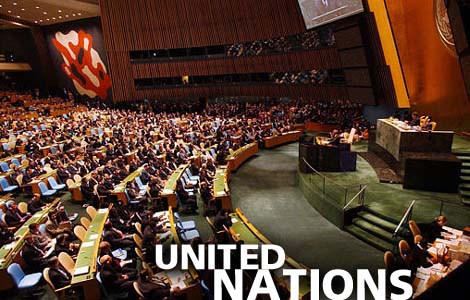Nicaragua priest to open UN General Assembly Tuesday
 New York - The UN General Assembly prepared Monday to open its 63rd annual session, confronted with a host of challenges topped by the resilient issues of fighting poverty and hunger, disease and climate change.
New York - The UN General Assembly prepared Monday to open its 63rd annual session, confronted with a host of challenges topped by the resilient issues of fighting poverty and hunger, disease and climate change.
The 192-nation body was to begin the new session on Tuesday under the presidency of Father Miguel d'Escoto Brockman, a Roman Catholic priest from Nicaragua, the first time a clergyman will take the reins of the body dominated by non-aligned, Arab and Islamic countries.
Next week, dozens of heads of state and government and delegates from member countries will hold their annual political debate, from September 23 to October 1.
Following the opening of the 63rd session on Tuesday, the assembly was to embark on official preparations for the debate.
The outgoing president of the 62nd session, Srgjan Kerim of the former Yugoslavian republic of Macedonia, who closed his own session on Monday, had pushed climate change to the forefront of the agenda of debate and brought UN members to support programmes to fight terrorism, poverty and HIV/AIDS.
D'Escoto Brockman, who prefers to be called Father Miguel, will be confined to the assembly's agenda for discussion despite his leftist background as the former foreign minister of the Sandinista government in Nicaragua in the 1990s.
He was elected in June without a vote by the assembly to the rotating leadership post, which fell this year to Latin America and the Caribbean. He was the choice of that region and had no challengers. The early election was intended to allow him time to prepare for the duties.
The 75-year-old priest-turned-diplomat is himself a controversial personality in Latin American politics. Born in Los Angeles in 1933 into a family of diplomats, Brockman studied at Columbia University in New York, then decided to take up the priesthood.
He was ordained in 1961 as a member of the Maryknoll Missionary Congregation.
The priest returned to Nicaragua to join the Sandinista National Liberation Front in its struggle against the US-backed government in Managua, and was appointed foreign minister in 1979 when it overthrew the US-backed Samoza government.
He stepped down as foreign minister in 1990 with the end of the Sandinista regime, which was voted out of office in multi-party elections.
On Monday, in one of the last acts of the 62nd session, the assembly held the first International Day of Democracy to highlight the work of strengthening democratic institutions around the world.
The assembly two years ago created the UN Democracy Fund, with funds provided by members to help nations struggling to reform their governments. The programme supports everything from transparency in elections to writing legislation and formulating constitutions. Funds have been provided by 35 donors, including Italy, Germany, Japan, South Korea and Qatar.
"As we conduct our work, we must be mindful of a tendency in some parts of the world to question the very value of democracy," UN Secretary General Ban Ki-moon said.
"There is a perception among some countries that democracy has failed to improve people's lives - even where democracy was believed to have deep roots," Ban said. "Adding to that is the perception by some that democracy-building is foreign-sponsored political interference."
Ban reiterated the UN mission to support democratic institutions "in their work to ensure better lives for the population at large."
Ban had made climate change one of major issues to be tackled by the UN.
He set an example by lowering the thermostat at UN headquarters in New York by 2.5 degrees Centigrade during summer in order to cut emissions of greenhouse gases and save money. But the plan was terminated on Monday on the eve of the opening of the assembly, conveniently to facilitate the holding of meetings in coming months. (dpa)